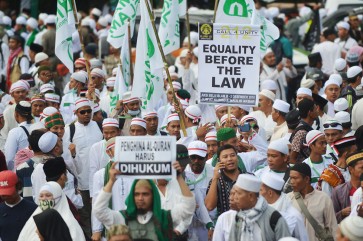Popular Reads
Top Results
Can't find what you're looking for?
View all search resultsPopular Reads
Top Results
Can't find what you're looking for?
View all search resultsThe economy, inequality and populism
One aspect that has contributed to the rise of populism is high inequality. In Indonesia, populism is largely associated with Islam.
Change text size
Gift Premium Articles
to Anyone
 One aspect that has contributed to the rise of populism is high inequality. In Indonesia, populism is largely associated with Islam. Large demonstrations in November and December last year against former Jakarta governor Basuki “Ahok” Tjahaja Purnama due to blasphemy charges shows the growing populism related to Islam in the political arena. (Antara/Akbar Nugroho Gumay)
One aspect that has contributed to the rise of populism is high inequality. In Indonesia, populism is largely associated with Islam. Large demonstrations in November and December last year against former Jakarta governor Basuki “Ahok” Tjahaja Purnama due to blasphemy charges shows the growing populism related to Islam in the political arena. (Antara/Akbar Nugroho Gumay)
I
nequality in Indonesia is considered high with a Gini ratio at around 0.39. Inequality on the Gini scale is measured between 0, representing perfect equality, and 1, representing perfect inequality.
Inequality is getting higher at a time of high commodity prices as high income groups get more benefits from the commodities boom. Meanwhile, people in the bottom quantile get a low share of the economy.
High inequality is also related to the slowing down of the manufacturing sector, which many saw as a sign of deindustrialization. This is understandable as manufacturing is supposed to employ a large number of workers as an effective mechanism to reduce inequality.
Inequality also shows strikingly high in the financial sector, in which practically about 0.5 percent of depositors dominate around 75 percent of total banking deposits. As only around 30 percent of the population have access to formal financial institutions, the inequality in the financial sector keeps the overall inequality high. This is the power number at play here, with the rich getting richer, although the poor are not getting poorer as the poverty level shows a decline.
There are some indications that the economy has shown some improvement. The economy grew 5.01 percent in the first quarter this year as exports and commodity prices increased.
However, economic growth could hover at around 5 percent in the short run — probably in the next two years — and so the prospect for inequality would remain high.
This could give a wider implication not only to the economy but also social cohesion. In many countries, developing and developed economies, inequality plays a major role in drifting social and political dynamics into rising populism, which is anti-establishment, anti-immigrant and calls for protectionism. In Indonesia, inequality also has a significant role in fueling sectarian moves with serious sociopolitical implications.

















